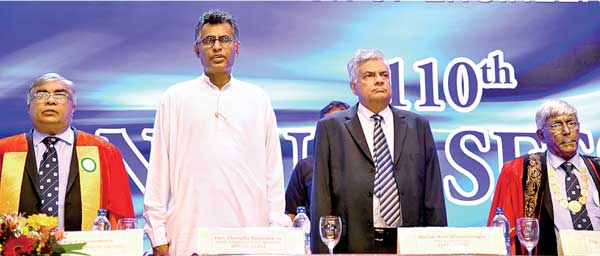Reply To:
Name - Reply Comment
 From left: IESL President Elect Eng. Jayavival Meegoda, Megapolis and Western Development Minister Patali Champika Ranawaka, Prime Minister Ranil Wickremesinghe and IESL President Eng. Wimalasena Gamage
From left: IESL President Elect Eng. Jayavival Meegoda, Megapolis and Western Development Minister Patali Champika Ranawaka, Prime Minister Ranil Wickremesinghe and IESL President Eng. Wimalasena Gamage
Pic by Kithsiri De Mel
By Shabiya Ali Ahlam
As Sri Lanka looks to speed up its development pace to become a high income economy by 2030, Prime Minister Ranil Wickremesinghe stressed the need for innovation, technology, and having technical personnel with the right skills, to achieve the target.
In a bid to leapfrog and make up for the lost opportunities, Wickremesinghe asserted that in Sri Lanka’s journey in becoming a high income economy “up-scaling” in all the spheres of technology was imperative.
“We need to go into a knowledge-based economy and for that we need innovation. We require more technology but that is going to be one of the biggest issues we are going to face. We must promote innovation.
“However, the constraint to our development is the shortage of technological personnel,” said Wickremesinghe at the Institution of Engineers’, Sri Lanka (IESL), Annual Sessions which was held last Friday in Colombo.
Affirming the government’s support, Wickremesinghe pointed out the need for the local engineering talent pool to be developed
and upgraded.
With a single agency to take charge i.e. IESL, Wickremesinghe stressed that with the ongoing trade negotiations such as the Indo-Sri Lanka Economic and Technology Cooperation Agreement (ETCA), care should be taken to ensure the local engineers are not “placed at a disadvantage, or treated as second class”.
Wickremesinghe also drew attention to the fact that Sri Lanka, despite aiming to fulfill a number of ambitions, did not have sufficient educational institutions to support its growth agenda.
“There simply aren’t enough high level institutions. We first need to develop the existing institutions by focusing on the University of Moratuwa and the Engineering Faculty of the University of Peradeniya. We need to look at having postgraduate research and other types of advance research,” he noted.
Wickremesinghe went on to add that even if the mentioned universities were upgraded, the two alone may not be sufficient. Attempting to have a greater pool of education institutions, mainly in the areas of technology, he said that the government was currently engaged in dialogue with a few American, Indian and Japanese institutes to have their branches set up in Sri Lanka.
As pointed out by Wickremeginehe, the next level which needed to be revisited is the training system embraced by the local education sphere. According to him, the authorities need to explore whether the existing British training system should be abandoned and the dual training system of Germany should be embraced.
“We need to look at upgrading our workmen since automation will have a huge role to play in the immediate term. Coming in are areas such as robotics, nanotechnology and we need people trained in those areas. If we cannot find them, then our whole exercise will fail,” he stressed.
The country’s dwindling foreign reserves will be bolstered in the coming months as the government expects an inflow US $ 1 billion for infrastructure projects through a Public-Private Partnership (PPP).
With the government currently negotiating a PPP with China for the development of the Hambantota harbour and Mattala Airport, Prime Minister Ranil Wickremesinghe said the finalization of the deal, which may happen next month should fetch over US $ 1 billion.
“We hope by the next month or so we will have over $1 billion available in our reserves. This will reduce our debt since we have asked for upfront payment,” Wickremeginshe said.
He added that the two deals that comprised of non-debt creating FDI inflows would help increase the official reserves significantly.
“Such reserves would have a more favourable impact on stabilizing the exchange and interest rates than building up reserves using borrowed money,” noted Wickremesinghe. (SAA)